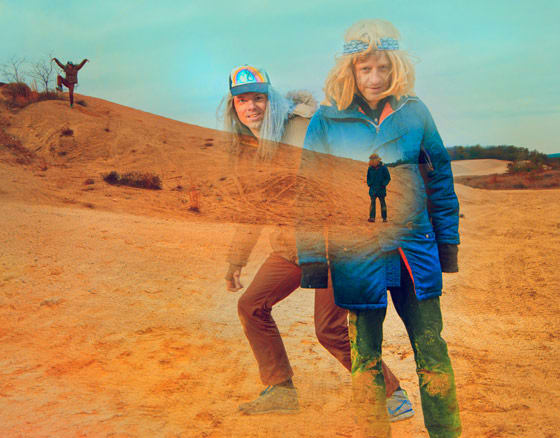It's a story blown out of proportion throughout history — a once legendary underground band enters a real recording studio, switches record labels, and tweaks their sound. But in the case of legendary Rhode Island noise rock voyagers Lightning Bolt, evolution has been a quiet constant for two decades.
There are two Brians acting as the brains of the operation — drummer/vocalist Chippendale and bassist Gibson. Since meeting in 1994, they've continued working in the same zone — frenetic, free jazz-leaning drums, barely there vocal yelps and iconic, skull-crushing bass riffs. Even the band's album titles have followed a pattern, with two-word phrases comprising the names of all but one release, 2001's verbose Ride the Skies.
"We're definitely into consistency," Chippendale says. "With Lightning Bolt, it's the same process but I'm just a little older.... We both evolve really slowly." That's not to say the process hasn't changed. Lightning Bolt's previous six albums were recorded live into a board, and they'd rarely touch an EQ. For Fantasy Empire, the duo tried their hand in a real recording studio, even adding an overdub or two. It's an entirely normal recording experience, but Gibson describes it like it was revelatory. "The attitude we had this time was... if we didn't capture it in a way that's making the song as awesome as it should be, then we'll do things in post-production to make it awesome."
Fantasy Empire also marks Lightning Bolt's first album on a new label, hopping from their longtime home, Load Records, to the ever-so-slightly bigger Thrill Jockey. It's a strange place for a band to be in — they're not exactly selling their songs to car commercials or playing McDonald's-sponsored festival showcases, but Lightning Bolt are still a vital force. "We kind of got grandfathered in where we're in this spot where we can kind of go anywhere and play," Chippendale says. "But it's funny when people ask me for advice now, like, 'How should we go about touring?' I have no idea."
"When we started, I had this sense that one day we would arrive at what Lightning Bolt is, but that day just never came," Gibson confesses. "I know it does feel really concrete for other people at this point. Everybody has their own inner sense of the falseness of their own identity."
Ever philosophical, Gibson's learned to embrace the journey rather than the destination. "In the past, I thought we would find some solutions and then we would just be amazing forever," he says. "But the thing I learned is that once you find the solution that works, you get bored of it and you need to change."
There are two Brians acting as the brains of the operation — drummer/vocalist Chippendale and bassist Gibson. Since meeting in 1994, they've continued working in the same zone — frenetic, free jazz-leaning drums, barely there vocal yelps and iconic, skull-crushing bass riffs. Even the band's album titles have followed a pattern, with two-word phrases comprising the names of all but one release, 2001's verbose Ride the Skies.
"We're definitely into consistency," Chippendale says. "With Lightning Bolt, it's the same process but I'm just a little older.... We both evolve really slowly." That's not to say the process hasn't changed. Lightning Bolt's previous six albums were recorded live into a board, and they'd rarely touch an EQ. For Fantasy Empire, the duo tried their hand in a real recording studio, even adding an overdub or two. It's an entirely normal recording experience, but Gibson describes it like it was revelatory. "The attitude we had this time was... if we didn't capture it in a way that's making the song as awesome as it should be, then we'll do things in post-production to make it awesome."
Fantasy Empire also marks Lightning Bolt's first album on a new label, hopping from their longtime home, Load Records, to the ever-so-slightly bigger Thrill Jockey. It's a strange place for a band to be in — they're not exactly selling their songs to car commercials or playing McDonald's-sponsored festival showcases, but Lightning Bolt are still a vital force. "We kind of got grandfathered in where we're in this spot where we can kind of go anywhere and play," Chippendale says. "But it's funny when people ask me for advice now, like, 'How should we go about touring?' I have no idea."
"When we started, I had this sense that one day we would arrive at what Lightning Bolt is, but that day just never came," Gibson confesses. "I know it does feel really concrete for other people at this point. Everybody has their own inner sense of the falseness of their own identity."
Ever philosophical, Gibson's learned to embrace the journey rather than the destination. "In the past, I thought we would find some solutions and then we would just be amazing forever," he says. "But the thing I learned is that once you find the solution that works, you get bored of it and you need to change."
